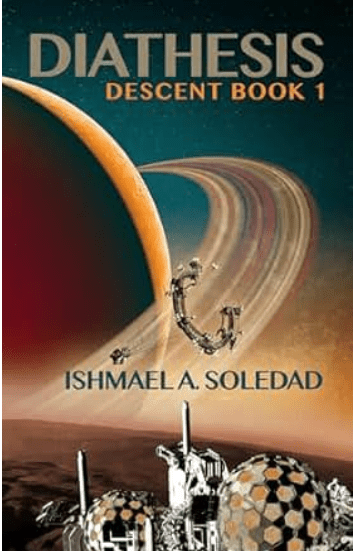
For all things fantasy, horror, and speculative fiction

Review Details
Review type: Book
Title: Diathesis
Author: Ishmael A Soledad
Publisher: Temple Dark Books
Release date: 18th April 2025

Reviewed by: Adrian Fletcher
Other details: Kindle RRP £3.99
Diathesis by Ishmael A Soledad
Book Review
Adrian Fletcher
Set roughly 100 years in the future, Diathesis focuses on a selection of seemingly unconnected characters as they make their way in a world that’s been deeply affected by climate change and other negative effects of humanity. Interestingly, the environmental damage and how that feeds into global politics is very much a backdrop, Diathesis is concerned with the characters rather than a deep dive into the specifics of their circumstances.
Maria is a scientist whose parents, environmental activists, died when she was young. After later losing her grandmother, Maria is motivated to create an alternative to anaesthetic that induces a sort of suspended animation. At a University in Paris she meets a Japanese scientist who is obsessed with creating what he calls Non-Biological Intelligence, an evolution of AI that would be able to truly learn on its own.
Concurrently, we’re introduced to a group of young children at a training facility. Overseen by advanced robots, the children are trained and assessed without being told what purpose they were created for.
The final major character is Li Qiao, who’s raised by his grandparents and occasionally visited by the father who did not want him. After a run in with the law, he opts to join the military to follow in his father’s footsteps.
In the background of the story, is the Ismud project. A manned space expedition, years in the making, humanity’s first step into the wider universe. Each of the characters has their own opinion on the Ismud project and it’s interesting to see how those opinions colour the character’s motivations and actions as the separate strands begin to weave together.
For a novel that is nominally hard science fiction, I found the writing style engaging. Diathesis is a surprisingly easy read, chapters flowing into each other, lulling you into reading more. There’s no hand holding here, although there are a lot of concepts, Soledad doesn’t tell us what to think of them. Characters don’t explain themselves and their emotions to us, but their actions are consistent with what we know of them, leaving us to draw our own conclusions. One theme in particular that stood out for me, is the impact parents, and caregivers, have on their children. Each character is impacted in their own way by their upbringing, and we see that in their development, but there’s room for interpretation.
There are a few minor negatives. A lack of direct information on the state of Earth left me a little unsure whether the characters we were seeing are typical examples of humanity. A little more world-building there would’ve potentially made some of what follows more impactful. The ending sets up the next book perfectly, but it did feel like the first part of a story, so prepare to engage in the full series. This isn’t a book to stand on its own.
Diathesis is an extremely promising start to a series. It’s high concept but maintains its readability. It has strong characters, from a diverse set of backgrounds, reflecting how the issues it raises impact the world, which juxtaposes nicely with the relatively narrow focus on the characters. The balance between cosmic scale and personal stakes adds weight to the story. The story of the genetically engineered children is a particular standout. Book two is out later this year and is one to look out for.
Tags: Character DrivenClimate FictionDystopianScience Fiction
Category: Book Review
All reviews
Latest Reviews:
- Pendragon RPG: The Sauvage King
- Januaries by Olivie Blake
- Basic Roleplaying: Creatures
- Five Mini-Adventures – PDF (Shadowdark RPG)
- Cursed Scroll Zine, Vol. 1: Diablerie! RPG Zine
- Empire of the Dawn by Jay Kristoff
- The God and the Gumiho by Sophie Kim
- Citadel of the Moon by Mike Chinn
- Hemlock and Silver by T. Kingfisher
- Thirsty by Lucy Lehane
Review tags:
Action (49) Adventure (70) Contemporary Fantasy (18) Fantasy (120) Gothic Horror (12) Harper Voyager (12) Historical Fantasy (14) Hodderscape (12) Horror (76) Orbit Books (33) Romance (28) Romantasy (13) Science Fiction (35) Titan Books (36) TorDotCom (12)
Leave a Reply